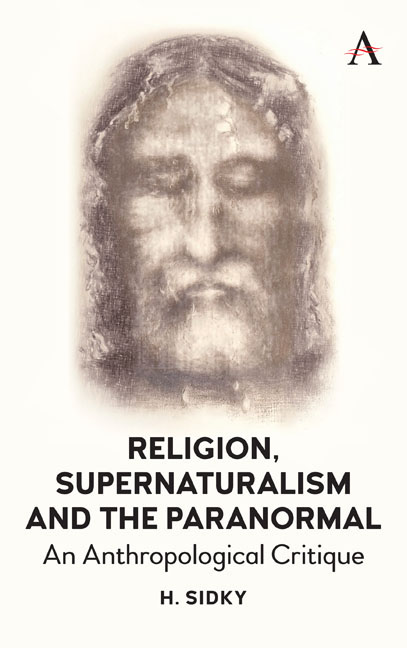Book contents
- Frontmatter
- Dedication
- Contents
- Acknowledgments
- Introduction
- Chapter One The Problem with Religion: Preliminary Issues
- Chapter Two The Unreal Real: The Supernatural, Religion, and the Paranormal
- Chapter Three Can Science Say Anything About Religion and the Supernatural?
- Chapter Four Ghostly Rappings, the Science of the Soul, and the Religious Nature of the Paranormal
- Chapter Five Ghostly Encounters in the Field: Anthropology of the Paranormal or Paranormal Anthropology?
- Chapter Six Why We Think the World Is Haunted
- Chapter Seven Cognitive Biases and Why People Think Eerie Thoughts
- Chapter Eight Miracles as Evidence of God's Actions in the World
- Chapter Nine When God Talks to People: Are Religious Experience Evidence of God?
- Chapter Ten Books Authored by God? Sacred Texts as Evidence of the Supernatural
- Chapter Eleven God's Fingerprints in the Natural World: Intelligent Design, Irreducible Complexity, and Cosmic Fine-Tuning
- Chapter Twelve The Miracles of the Bible: The Quintessential Foundations of Paranormal Beliefs in Western Culture
- Chapter Thirteen Jesus the Miracle Worker, Magician, and Sorcerer
- Chapter Fourteen Jesus's Empty Tomb, Missing Body, and Return from The Dead: Sources for the Paranormal Tale
- Chapter Fifteen The Post-Resurrection Appearances in the New Testament
- Chapter Sixteen Coping with Failed Prophesy: A Socio-Psychological Explanation for the Rise of Christianity
- Chapter Seventeen Conclusions: Why Religious and Paranormal Beliefs Persist and Their Dangers
- References
- Index
Chapter One - The Problem with Religion: Preliminary Issues
Published online by Cambridge University Press: 16 December 2019
- Frontmatter
- Dedication
- Contents
- Acknowledgments
- Introduction
- Chapter One The Problem with Religion: Preliminary Issues
- Chapter Two The Unreal Real: The Supernatural, Religion, and the Paranormal
- Chapter Three Can Science Say Anything About Religion and the Supernatural?
- Chapter Four Ghostly Rappings, the Science of the Soul, and the Religious Nature of the Paranormal
- Chapter Five Ghostly Encounters in the Field: Anthropology of the Paranormal or Paranormal Anthropology?
- Chapter Six Why We Think the World Is Haunted
- Chapter Seven Cognitive Biases and Why People Think Eerie Thoughts
- Chapter Eight Miracles as Evidence of God's Actions in the World
- Chapter Nine When God Talks to People: Are Religious Experience Evidence of God?
- Chapter Ten Books Authored by God? Sacred Texts as Evidence of the Supernatural
- Chapter Eleven God's Fingerprints in the Natural World: Intelligent Design, Irreducible Complexity, and Cosmic Fine-Tuning
- Chapter Twelve The Miracles of the Bible: The Quintessential Foundations of Paranormal Beliefs in Western Culture
- Chapter Thirteen Jesus the Miracle Worker, Magician, and Sorcerer
- Chapter Fourteen Jesus's Empty Tomb, Missing Body, and Return from The Dead: Sources for the Paranormal Tale
- Chapter Fifteen The Post-Resurrection Appearances in the New Testament
- Chapter Sixteen Coping with Failed Prophesy: A Socio-Psychological Explanation for the Rise of Christianity
- Chapter Seventeen Conclusions: Why Religious and Paranormal Beliefs Persist and Their Dangers
- References
- Index
Summary
Too absurd for belief, too impossible to convince, and too inconsistent for practice, [religion] renders the heart torpid, or produces only atheists and fanatics. As an engine of power, it serves the purpose of despotism; and as a means of wealth, the avarice of priests; but so far as respects the good of [humans] in general, it leads to nothing here or hereafter.
— Thomas Paine, The Age of Reason (1795)That which is absurd and impossible, that which in any other history would be called falsehood, deception, outrage, and cruelty, cannot be made reasonable, righteous, and true by the added words: Thus saith the Lord.
— Hermann Reimarus, Fragments from Reimarus (1879)A good world needs knowledge, kindness, and courage; it does not need a regretful hankering after the past or a fettering of the free intelligence by the words uttered long ago by ignorant men.
— Bertrand Russell, Why I Am Not a Christian (1957)More wars have been waged, more people killed, and these days more evil perpetrated in the name of religion than by any other institutional force in human history.
— Charles Kimball, When Religion Becomes Evil (2008)In the second decade of the twenty-first century, religion has become one of the most powerful and dangerous forces in the world. For an overwhelming number of devout believers, faith and the triumph of their respective religions outweigh the sanctity of human life as well as all other concerns, including peace on earth, human rights, secularism, democracy, and the fate of this planet (cf., Dennett 2006: 15– 16). Religious hatreds, violence, and warfare in the name of one vicious god or another have obliterated whole generations and torn apart entire societies. I have personally lived through and witnessed such tragic events during my travels and field research around the world during the last 30 years.
These are harsh words, and indignant believers will present the standard objections that religion is indispensable because it provides psychological solace, meaning, a sense of community, and, above all, that it ensures moral behavior (Konner 2019: 175– 76).
Information
- Type
- Chapter
- Information
- Religion, Supernaturalism, the Paranormal and PseudoscienceAn Anthropological Critique, pp. 5 - 38Publisher: Anthem PressPrint publication year: 2019
